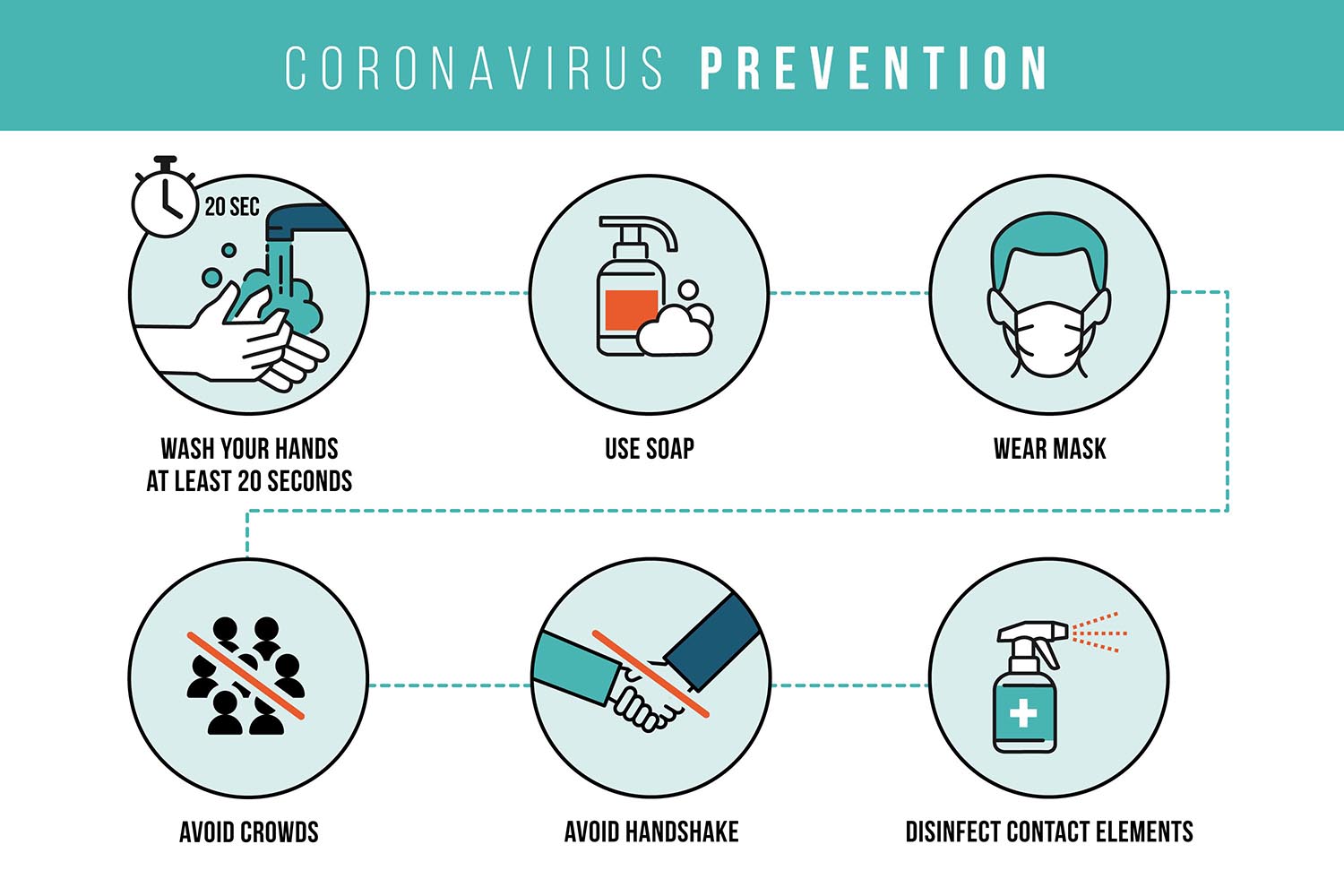Covid-19 Awareness
- Home
- Covid-19 Awareness
Disclaimer: The information given here is only intended to create awareness. Government guidelines or medical advice supercede any information given here.
CAUSE & ORIGIN
COVID-19 is the disease caused by a new coronavirus called SARS-CoV-2. World Health Organization (WHO) first learned of this new virus on 31 December 2019, following a report of a cluster of cases of ‘viral pneumonia’ in Wuhan, People’s Republic of China.
VIRUS TRANSMISSION
The virus spreads primarily through droplets generated when an infected person:
- coughs, sneezes
- droplets of saliva transmitted through air while speaking in close proximity
- discharge from the nose
HIGH RISK LOCATIONS
- Public transport
- Gymnasium
- Congregations (wedding, death service, place of worship, entertainment show, meeting, protest, festival, sport, party, etc.)
- Market / Mall
- Hotel / Resort
- Movie theatre
- Restaurant
- Medical facilities (hospitals, clinics, laboratories, vaccination centres, etc.)
- Workplace (office, factory, warehouse, shop, kitchen, etc.)
PRECAUTION
- Stay home, as far as possible
- Avoid crowded places, as far as possible
- Boost immune system (Vitamin C, Zinc, Kabasurakudineer, etc.)
- Eat healthy and stay hydrated
- Get vaccinated
PREVENTION
- Maintain social distancing (minimum 6 feet)
- Wear a proper mask (preferably N95 or at least 3-ply surgical mask)
- Sanitize hands regularly (wash with soap or use hand sanitizer)
- Avoid touching face while wearing mask
SYMPTOMS
The most common symptoms of COVID-19 are:
- Fever
- Dry cough
- Fatigue (feeling tired)
Other symptoms that are less common and may affect some patients include:
- Loss of taste or smell
- Nasal congestion
- Conjunctivitis (also known as red eyes)
- Shortness of breath
- Sore throat
- Headache
- Muscle or joint pain
- Different types of skin rash
- Nausea or vomiting
- Diarrhoea
- Chills or dizziness
VULNERABLE CATEGORIES
- Older people (Above 65 years)
- People with comorbidities (Diabetes, Hypertension, Cancer, HIV, Ailment in heart, kidney, liver, lungs, etc.)
- Pregnant women
- People with inherent low immunity
VACCINATION
It’s advisable for people who have symptoms of Covid-19 to test before deciding to take the vaccine.
What is vaccination?
- Vaccination is a simple, safe, and effective way of protecting people against harmful diseases, before they come into contact with them. It uses your body’s natural defences to build resistance to specific infections and makes your immune system stronger.
- Vaccines train your immune system to create antibodies, just as it does when it’s exposed to a disease. However, because vaccines contain only killed or weakened forms of germs like viruses or bacteria, they do not cause the disease or put you at risk of its complications.
- Most vaccines are given by an injection, but some are given orally (by mouth) or sprayed into the nose.
What are the benefits of getting vaccinated?
The COVID-19 vaccines produce protection against the disease, as a result of developing an immune response to the SARS-Cov-2 virus. Developing immunity through vaccination means there is a reduced risk of developing the illness and its consequences. This immunity helps you fight the virus if exposed. Getting vaccinated may also protect people around you, because if you are protected from getting infected and from disease, you are less likely to infect someone else. This is particularly important to protect people at increased risk for severe illness from COVID-19, such as healthcare providers, older or elderly adults, and people with other medical conditions.
What are the vaccines available in India?
- Covishield: Developed by Oxford – Astrazenaca and manufactured under license by Serum Institute of India (SII), Pune.
- Covaxin: Developed Bharat Biotech in collaboration with Indian Council of Medical research (ICMR) and manufactured by Bharat Biotech, Hyderabad.
- Sputnik V: Developed by Gamaleya National Research Centre of Epidemiology and Microbiology, Moscow, Russia and to be produced by Dr. Reddy’s Laboratories, Hyderabad.
What are the most common reactions & effects after taking vaccine?
- High temperature or feeling feverish
- Tenderness, pain, warmth, redness, itching or swelling at the injection site
- Nausea (vomiting sensation)
- Fatigue (feeling tired)
- Joint pain or muscle ache
- Headache
Who and when can vaccination be taken?
- It’s highly recommended for people with some complicated disease or medical condition to consult their doctor before taking vaccine.
- Pregnant women should consult their doctor to decide whether or not and when to take the vaccine.
- It’s advisable for people who have recovered from Covid-19 to consult their doctor on when they could take the vaccine.
- As of now, vaccine is recommended only for people above the age of 18 years
RESPONSE TO SYMPTOMS
- Check Temperature
- Take Covid-19 test (RT-PCR)
- Get medical advice, if tested “Positive”
TREATMENT & CURE
- Stay calm and relaxed. More than 90% of the people don’t need hospitalization.
- Isolate yourself in a well-ventilated room with an attached rest room.
- Avoid contact with anyone else. Wear mask when you open the room door.
- Check temperature regularly and take the recommended medicine for fever
- Stay hydrated (drink lot of water).
- Boost your immune system with healthy food and vitamin supplements (Vitamin C and Zinc). Kabasurakudineer once or twice a week is recommended.
- In case of breathing difficulty, try “Pronal breathing technique” to improve oxygen levels.
- In case of persistent breathing difficulty or fever, consult a doctor immediately and follow medical advice.



